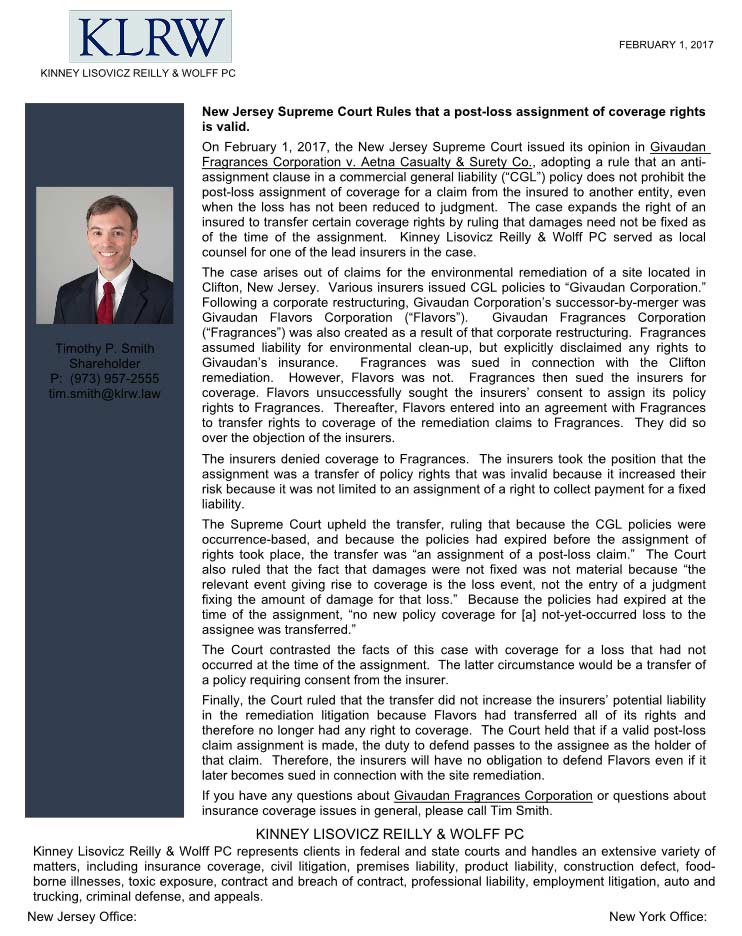E-Alert: New Jersey Supreme Court Rules That A Post-Loss Assignment Of Coverage Rights Is Valid
KLRW Raises Money for Market Street Mission
January 6, 2017Kevin Wolff spoke at the CLM Alliance on liability and insurance coverage issues relating to autonomous vehicles and ridesharing.
March 8, 2017E-Alert: New Jersey Supreme Court Rules That A Post-Loss Assignment Of Coverage Rights Is Valid
New Jersey Supreme Court Rules that a post-loss assignment of coverage rights is valid.
On February 1, 2017, the New Jersey Supreme Court issued its opinion in Givaudan Fragrances Corporation v. Aetna Casualty & Surety Co., adopting a rule that an anti- assignment clause in a commercial general liability (“CGL”) policy does not prohibit the post-loss assignment of coverage for a claim from the insured to another entity, even when the loss has not been reduced to judgment. The case expands the right of an insured to transfer certain coverage rights by ruling that damages need not be fixed as of the time of the assignment. Kinney Lisovicz Reilly & Wolff PC served as local counsel for one of the lead insurers in the case.
The case arises out of claims for the environmental remediation of a site located in Clifton, New Jersey. Various insurers issued CGL policies to “Givaudan Corporation.” Following a corporate restructuring, Givaudan Corporation’s successor-by- merger was Givaudan Flavors Corporation (“Flavors”). Givaudan Fragrances Corporation (“Fragrances”) was also created as a result of that corporate restructuring. Fragrances assumed liability for environmental clean-up, but explicitly disclaimed any rights to Givaudan’s insurance. Fragrances was sued in connection with the Clifton remediation. However, Flavors was not. Fragrances then sued the insurers for coverage. Flavors unsuccessfully sought the insurers’ consent to assign its policy rights to Fragrances. Thereafter, Flavors entered into an agreement with Fragrances to transfer rights to coverage of the remediation claims to Fragrances. They did so over the objection of the insurers.
The insurers denied coverage to Fragrances. The insurers took the position that the assignment was a transfer of policy rights that was invalid because it increased their risk because it was not limited to an assignment of a right to collect payment for a fixed liability.
The Supreme Court upheld the transfer, ruling that because the CGL policies were occurrence-based, and because the policies had expired before the assignment of rights took place, the transfer was “an assignment of a post-loss claim.” The Court also ruled that the fact that damages were not fixed was not material because “the relevant event giving rise to coverage is the loss event, not the entry of a judgment fixing the amount of damage for that loss.” Because the policies had expired at the time of the assignment, “no new policy coverage for [a] not-yet- occurred loss to the assignee was transferred.”
The Court contrasted the facts of this case with coverage for a loss that had not occurred at the time of the assignment. The latter circumstance would be a transfer of a policy requiring consent from the insurer.
Finally, the Court ruled that the transfer did not increase the insurers’ potential liability in the remediation litigation because Flavors had transferred all of its rights and therefore no longer had any right to coverage. The Court held that if a valid post-loss claim assignment is made, the duty to defend passes to the assignee as the holder of that claim. Therefore, the insurers will have no obligation to defend Flavors even if it later becomes sued in connection with the site remediation.
If you have any questions about Givaudan Fragrances Corporation or questions about insurance coverage issues in general, please call Tim Smith.
KINNEY LISOVICZ REILLY & WOLFF PC
Kinney Lisovicz Reilly & Wolff PC represents clients in federal and state courts and handles an extensive variety of matters, including insurance coverage, civil litigation, premises liability, product liability, construction defect, food- borne illnesses, toxic exposure, contract and breach of contract, professional liability, employment litigation, auto and trucking, criminal defense, and appeals.

